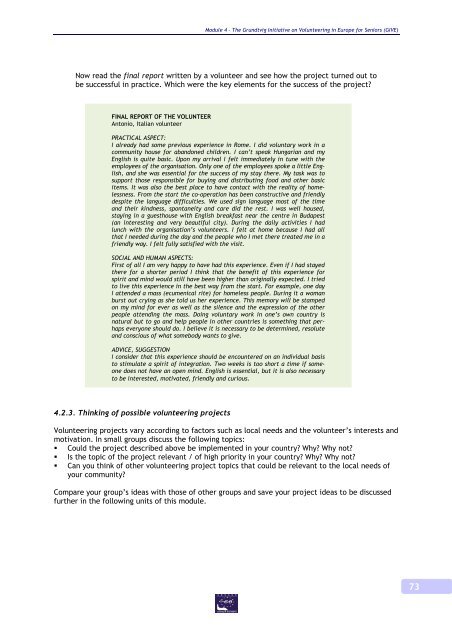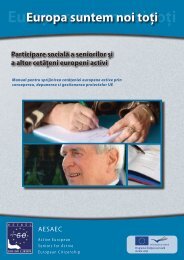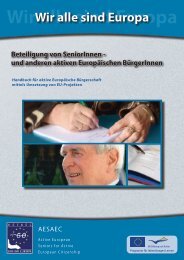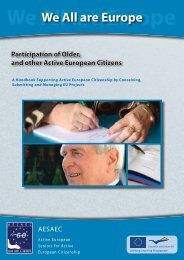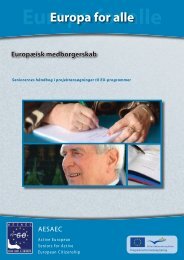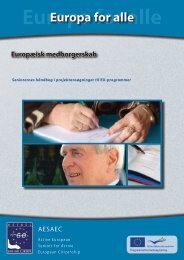We All are Europe - AESAEC
We All are Europe - AESAEC
We All are Europe - AESAEC
You also want an ePaper? Increase the reach of your titles
YUMPU automatically turns print PDFs into web optimized ePapers that Google loves.
Module 4 – The Grundtvig Initiative on Volunteering in <strong>Europe</strong> for Seniors (GIVE)<br />
Now read the final report written by a volunteer and see how the project turned out to<br />
be successful in practice. Which were the key elements for the success of the project<br />
FINAL REPORT OF THE VOLUNTEER<br />
Antonio, Italian volunteer<br />
PRACTICAL ASPECT:<br />
I already had some previous experience in Rome. I did voluntary work in a<br />
community house for abandoned children. I can’t speak Hungarian and my<br />
English is quite basic. Upon my arrival I felt immediately in tune with the<br />
employees of the organisation. Only one of the employees spoke a little English,<br />
and she was essential for the success of my stay there. My task was to<br />
support those responsible for buying and distributing food and other basic<br />
items. It was also the best place to have contact with the reality of homelessness.<br />
From the start the co-operation has been constructive and friendly<br />
despite the language difficulties. <strong>We</strong> used sign language most of the time<br />
and their kindness, spontaneity and c<strong>are</strong> did the rest. I was well housed,<br />
staying in a guesthouse with English breakfast near the centre in Budapest<br />
(an interesting and very beautiful city). During the daily activities I had<br />
lunch with the organisation’s volunteers. I felt at home because I had all<br />
that I needed during the day and the people who I met there treated me in a<br />
friendly way. I felt fully satisfied with the visit.<br />
SOCIAL AND HUMAN ASPECTS:<br />
First of all I am very happy to have had this experience. Even if I had stayed<br />
there for a shorter period I think that the benefit of this experience for<br />
spirit and mind would still have been higher than originally expected. I tried<br />
to live this experience in the best way from the start. For example, one day<br />
I attended a mass (ecumenical rite) for homeless people. During it a woman<br />
burst out crying as she told us her experience. This memory will be stamped<br />
on my mind for ever as well as the silence and the expression of the other<br />
people attending the mass. Doing voluntary work in one’s own country is<br />
natural but to go and help people in other countries is something that perhaps<br />
everyone should do. I believe it is necessary to be determined, resolute<br />
and conscious of what somebody wants to give.<br />
ADVICE, SUGGESTION<br />
I consider that this experience should be encountered on an individual basis<br />
to stimulate a spirit of integration. Two weeks is too short a time if someone<br />
does not have an open mind. English is essential, but it is also necessary<br />
to be interested, motivated, friendly and curious.<br />
4.2.3. Thinking of possible volunteering projects<br />
Volunteering projects vary according to factors such as local needs and the volunteer’s interests and<br />
motivation. In small groups discuss the following topics:<br />
Could the project described above be implemented in your country Why Why not<br />
Is the topic of the project relevant / of high priority in your country Why Why not<br />
Can you think of other volunteering project topics that could be relevant to the local needs of<br />
your community<br />
Comp<strong>are</strong> your group’s ideas with those of other groups and save your project ideas to be discussed<br />
further in the following units of this module.<br />
73


